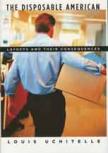Money Over People
Louis Uchitelle, a veteran New York Times reporter, examines the human costs of focusing on short-term financial gains and globalization—outsourcing, downsizing and layoffs. Millions experience the resulting anxiety and illness in their daily lives. In The Disposable American Uchitelle investigates the causes of layoffs that have become so common in the United States. Though he acknowledges the need for greater efficiencies and the advantages of globalization, he maintains nevertheless that layoffs are damaging and far more numerous than necessary.
Uchitelle recounts a United Airlines state-of-the-art airliner maintenance facility that opened in Indianapolis in 1991 and closed in 2003. He follows the lives of several ex-aircraft maintenance workers and their inability to obtain new skilled jobs at comparable pay. He calls this “the destruction of skill.” This situation counters the prevailing myth that those who possess higher skills easily find new jobs. More than half of the $600 million cost of the Indianapolis facility was subsidized by municipal and state governments in order to lure high-paying jobs. But across the country local governments provide $30 billion each year in subsidies to compete with other localities to attract such facilities. By 2003 United had outsourced maintenance operations to nonunion firms and closed the facility, laying off 2,400 highly skilled and well-paid mechanics. Since the airline paid less than half the cost of the facility, it was easier for them to walk away from it. The city and state now pay $37.5 million annually for mortgage and maintenance on the empty building.
Mergers are another cause of layoffs, since the acquiring firm must cut costs in order to pay for the acquisition. Macy’s, Citigroup, G.E. and hundreds of other firms have done this. Most of these mergers were financial and human failures. But the principal cost is borne by those who are laid off. Uchitelle cites methods of the financially oriented, often emulated and arguably morally immature ex-C.E.O. of G.E., Jack Welch: “The Welch way diverted the wages of tens of millions of laid off workers into corporate cash flow and profits, or into repayment of the loans that were floated to pay for all the maneuvering, or into the bloated incomes of the deal-makers.”
The prevailing American ideology calls for workers to blame themselves for their loss of a job, so the human costs of layoffs include a loss of self-esteem, personal anguish and mental illness. Workers in the United States have been protected by labor unions. But labor’s bargaining position has been eroded over the last few decades, such that management can now more easily lay off workers and hire replacements for strikers. Uchitelle describes the prestigious 1995 Dunlop Commission Report to the President, which found that workers desired greater cooperation with management and recommended that to do so effectively Congress should strengthen the bargaining power of workers. This report was never implemented, and management continues to have the upper hand over labor.
In his final chapter, “Solutions,” Uchitelle provides practical suggestions on how many layoffs could be avoided. He maintains, however, that we must first decide on our priorities as a people. “Are we going to once again be a community of people who feel obligated to take care of one another, or are we going to continue as a collection of individuals, each one increasingly concerned only with his or her well-being?”
The author is convinced that if we work together, greater job security could return to the United States. This would derive from a more transparent assessment of the true costs of layoffs, and acting on what we learn. Accounting for all the costs of pollution (“internalizing the external costs”) laid the foundation for the environmental movement, and Uchitelle says a parallel effort would bring more job stability. He urges a more accurate accounting of the reasons people leave their jobs; present definitions miss about half of those who leave jobs involuntarily. He also recommends federal legislation to prevent “the war of the states,” that is, states and cities competing with each other to see which can offer the largest subsidies to firms. Further, he urges that efforts be made to raise the wages of workers in developing countries, so they align more closely with those in America.
Addressing the imbalance between the loss of income of ordinary workers and the increased wealth of the few, the author cites the work of Richard Layard, a British economist: “...each additional dollar of income adds less to the happiness of a rich person than it does to the happiness of a lower-income person, who uses the dollar to meet real needs.” He also urges “community organizing,” by which local communities mobilize to present their needs and to press government for more just legislation and taxes.
Beyond layoffs alone, many people today point out that we are now victims of a shift from “democratic capitalism” (primary concern for people) to financial capitalism (primary concern for money), and this is what is driving globalization, outsourcing and the degradation of the environment, along with less concern for persons, families and communities. I would add one caution: from a social justice viewpoint, is a job in the United States worth more than a job in Bangladesh? (Still, “sweatshop” wages and working conditions are not acceptable).
The Disposable American rightly recognizes that jobs are vital to the future of the United States and the world. It is an engaging, informed and well-documented book. The author’s social justice and Gospel values are clear, although implied. I recommend the book to everyone concerned about the future of work and family income.
This article also appeared in print, under the headline “Money Over People,” in the July 31, 2006, issue.








